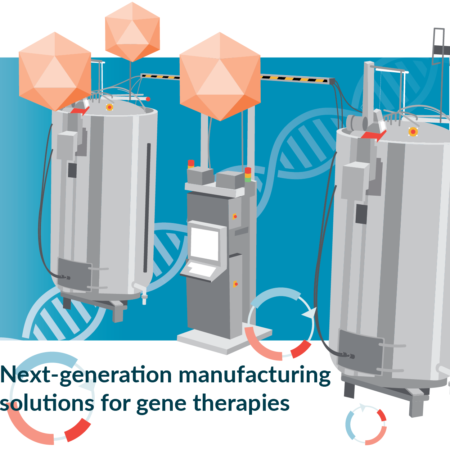Scalable AAV manufacturing – Addressing challenges across the workflow

The field of gene therapy has made a major comeback over the last decade, resulting in a significant paradigm shift in medicine. Due to improved safety and efficacy, the Adeno-Associated Virus (AAV) has emerged as one of the most important vectors for the development of gene therapies. With a handful of approved therapies available in Europe and US, and an extensively growing pipeline of clinical trials, it is evident that scalable and efficient solutions across the production workflow are needed.
Each production process for viral vectors has its own unique impediments and AAV is no exception. A successful viral manufacturing pipeline must deliver a consistent, pure, and high-titer product that exhibits good safety and efficacy to meet regulatory expectations.

During this webinar, upstream and downstream solutions across the AAV production workflow, are outlined. Scalable, high-titer AAV production is demonstrated in two cell host systems: a helper free 293F-based suspension system and the insect-cell based ExpiSf™ Expression System. In addition, we outline the benefits of implementing affinity chromatography in the downstream purification of AAV, including the viral clearance potential. Furthermore, we will address regulatory requirements for safety and purity testing during the AAV production process and discuss the benefits of implementing automated systems to save time and demonstrate product quality and safety.
- Learn more on AAV production in mammalian and insect cells using a new helper free 293F suspension system and the ExpiSf™ Expression System, respectively
- Understand how utilization of the POROS™ CaptureSelect™ AAVX resin results in significant improvement to the downstream process of AAV
- Learn more on ways to confirm purity using industry recognized and regulatory accepted real-time PCR residual host cell DNA solutions, such as resDNASEQ
- Understand mycoplasma testing regulatory requirements for lot release and how the MycoSEQ Rapid mycoplasma detection system has been validated and accepted by regulators in multiple modalities Sponsored by Thermo Fisher Scientific
You might also like

Achieving robust and scalable AAV empty/full capsid separation for gene therapy

AAV downstream challenges: expert insights

Mastering AAV production: best practices For small- to large-scale manufacturing success and reduced development time

Efficient AAV purification: resin reuse and scalable polish method





